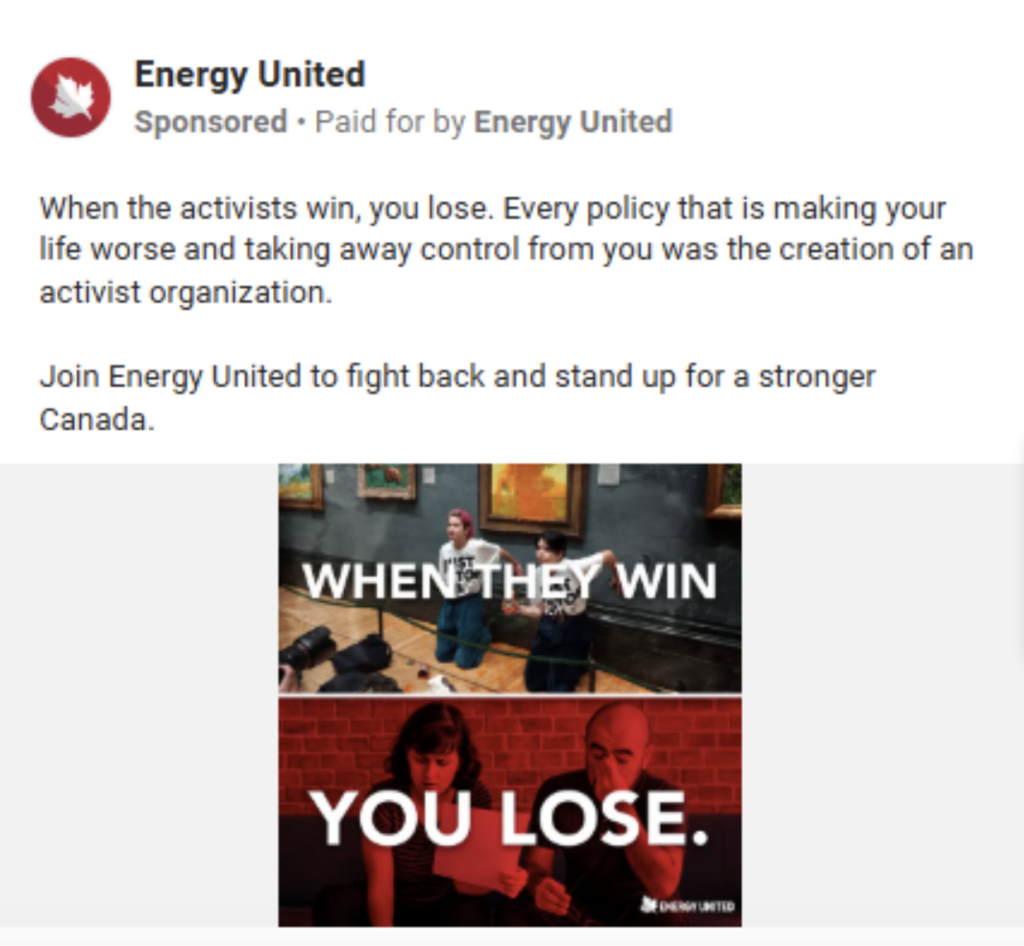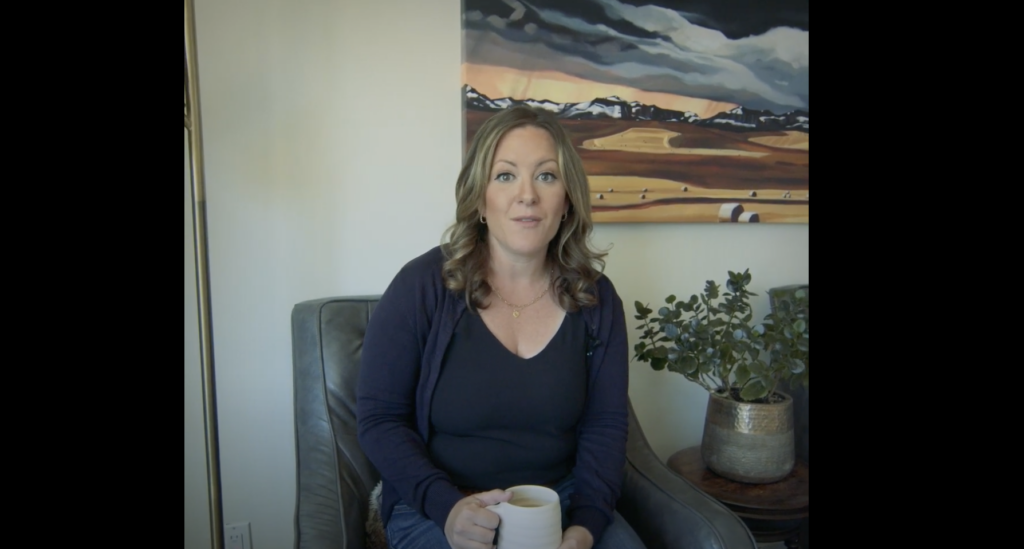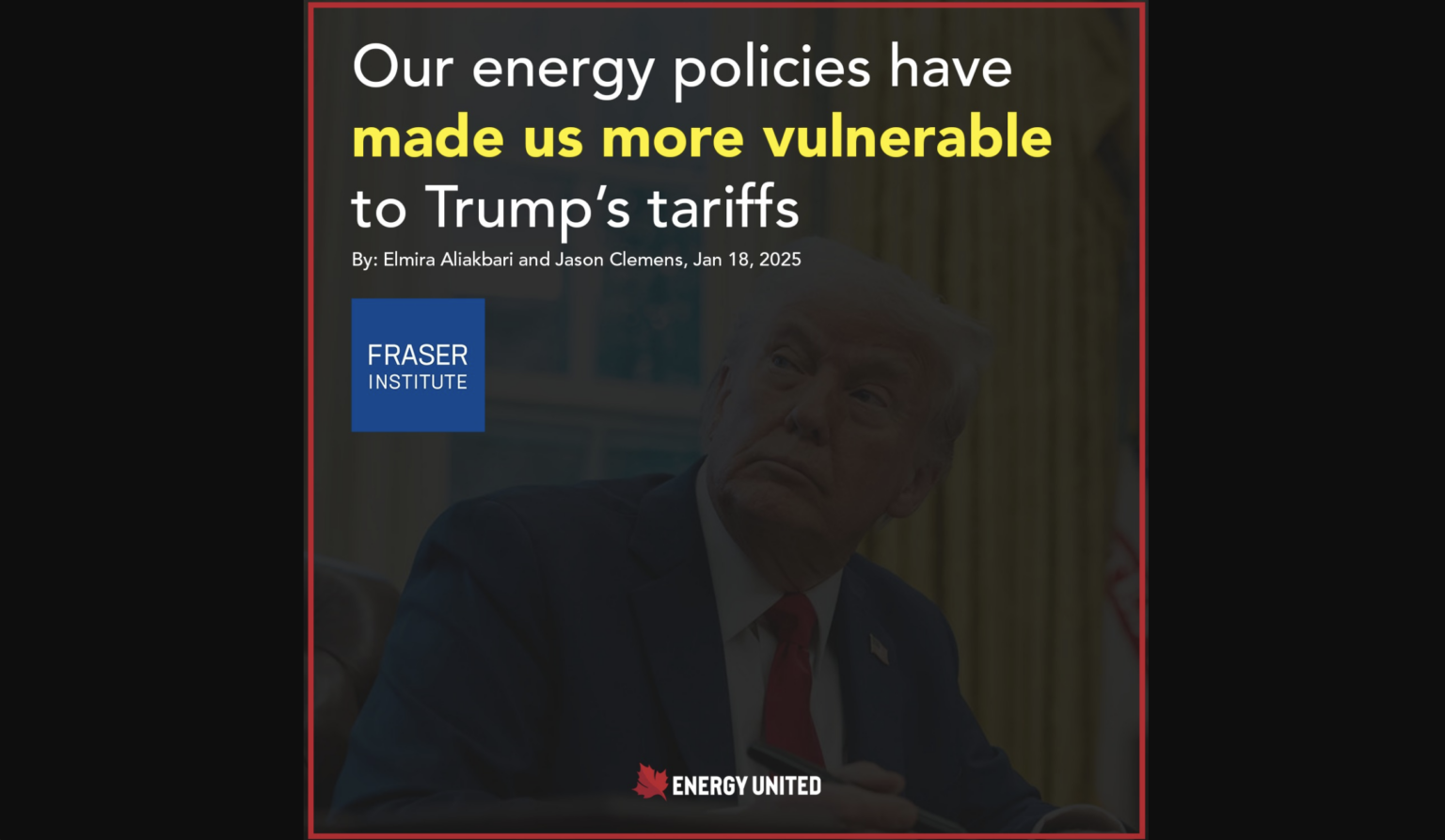Energy United, a Canadian advocacy group that claims environmental activists are “weakening our country” is closely linked to the oil and gas industry, as well as the governments of Alberta and Saskatchewan.
The organization produces provocative pro-oil and anti-environmentalist sponsored content for social media platforms.
Recent Energy United ads characterize “activists” as blocking growth and “pushing for more control over your life.”
“When the activists win, you lose,” reads one image. “Every policy that is making your life worse and taking away control from you was the creation of an activist organization.”
“Activists have blocked the growth of natural gas and oil at every opportunity, and it’s weakening our country,” reads another. “Join Energy United to fight back.”
“Radical policies are being implemented all over the world. From energy to agriculture, activists keep pushing for more control over your life.”

Energy United ads blame environmentalists, environmental policy, and cancelled energy projects for making Canada weaker and, by extension, primed for tariff and annexation threats by the current American president. Energy United does not provide evidence of their claims. Recent analysis by the Canadian Centre for Policy Alternatives rejects these and similar arguments, noting that some of the cancelled energy projects mentioned by Energy United failed because they were not financially viable and were cancelled by the companies promoting them.
DeSmog estimates that Energy United has spent at least $53,000 advertising on Meta platforms Facebook and Instagram since November 2024, despite not soliciting donations on its website. The Canadian Broadcasting Corporation (CBC) estimates that Energy United spent somewhere between $135,200 and $174,435 on 65 Facebook and Instagram ads critical of carbon taxes, which ran from November 1, 2023, to October 31, 2024. This makes Energy United the fourth-highest spender on carbon tax ads in the past year. According to the CBC, perhaps as many as 16.5 million Canadians saw the ads during this time.
CBC also listed several conservative parties — including the United Conservative Party of Alberta and the Saskatchewan Party, as well as Atlas Network affiliates like the Canadian Taxpayers Federation, and astroturfing groups like Canadians for Affordable Energy – as among those spending money on social media advertising against the carbon tax.
Energy United describes itself as a “grassroots” organization “with no affiliation to any political party” — a claim that University of Alberta political economist Gordon Laxer disputes. The Energy United website does not list its funding sources, raising questions about who is backing the well-funded campaign.
Given Energy United’s connections to the oil industry and conservative political parties, Laxer questions whether such an organization can genuinely be considered grassroots.
Energy United did not answer DeSmog’s questions when reached for comment.
Political Ties
Energy United’s campaign manager, Jarret Coels, is a former employee of the Canadian Association of Petroleum Producers (CAPP) and the Saskatchewan Party, the party that’s been governing that province since 2007.
“Coels is anything but grassroots,” said Laxer, noting that he was CAPP’s outreach campaigner for many years.

“CAPP financed and ran Canada’s Energy Citizens – a fake grassroots, oil advocacy group,” Laxer said. Canada’s Energy Citizens was a public outreach campaign developed by CAPP that flipped the idea of a grassroots protest movement on its head, instead advancing people employed by the oil sector (and their lobbyists) as “concerned citizens” participating in the democratic process. “Now that Coels is no longer with CAPP, he runs Energy United, another fake grassroots, oil advocacy group.”
Coels declined to answer questions for this story.
Energy United is a campaign organized by the Maple Leaf Institute. One of its directors, Cole David Schulz, is the husband of Alberta environment minister Rebecca Schulz.
Three of the institute’s four listed directors are also partners in Garrison Strategy, a public and government relations firm based in Calgary. All three of Garrison Strategy’s partners worked at CAPP during the same period of time between 2014 and 2022.
This is the second instance in just over a year in which Rebecca Schulz’s personal connection to Garrison Strategy has raised questions of a potential conflict of interest. Schulz did not respond to DeSmog’s request for comment.
Prior to founding Garrison in January 2023, Cole David Schulz worked for CAPP for nearly seven and a half years, including as vice president of communications. From 2009 to 2015, Schulz held a number of positions with the Saskatchewan Party, including chief of staff to the energy minister. Rebecca Schulz also worked in media relations roles for former Saskatchewan Premier Brad Wall.
On its website, Energy United identifies itself as a campaign by the Maple Leaf Institute, which has no website of its own. Despite its name, the institute has no academic affiliation, and is listed as a soliciting corporation active since 2023, with an office located in downtown Calgary. Soliciting corporations in Canada receive more than $10,000 in income from public sources – which can include donations from individuals or government grants – in a single financial year. Who specifically Maple Leaf Institute has received donations from over the past year isn’t clear.
History of Influence
Laxer argues the roots of today’s astroturfing campaigns goes back nearly 20 years.
“In 2007–2009, environmentalists had successfully portrayed the tar sands as dirty oil. The pic on the 2009 cover of National Geographic made the tar sands look like Mordor,” said Laxer, referring to the realm of the evil lord Sauron in J.R.R. Tolkien’s Lord of the Rings trilogy.
“This showed the Canadian Association of Petroleum Producers that it had to change its ground game — the old strategy of advertising only on legacy media was not working.”
Laxer says oil and gas lobbyists were encouraged to develop a new “shared energy story” that deepened the notion that the identities of Albertans – and other Canadians — are inextricably linked to oil.
“Subsequently, CAPP shifted to using ‘grassroots’ front groups to activate industry supporters.”
Laxer described the oil and gas industry in Canada as both foreign-funded and foreign-influenced. “All the Big Oil corporations in Canada are either wholly foreign owned, or else majority foreign owned,” said Laxer.
More Industry Overlap
Energy United, the Maple Leaf Institute and Garrison Strategy are all led by people who previously worked either for CAPP or the Saskatchewan Party. Two of Maple Leaf’s directors — Tim McMillan and Cole Schulz — are currently partners at Garrison Strategy and both are formerly associated with CAPP and the Saskatchewan Party. The institute’s other two listed directors — Dale Richardson and Samantha Yaholnitsky — both formerly worked for the Saskatchewan Party, in communications and campaigns roles, respectively.
Two of the institute’s former directors, Terry Grant Abel and Ben Brunnen, also worked for CAPP in executive roles. Abel is a partner with Garrison Strategy. Brunnen is now director of policy for Cenovus.
Tim McMillan is arguably the highest profile of Garrison’s partners, and also the strongest link between Garrison, Maple Leaf Institute, CAPP, and the Saskatchewan Party. McMillan served as CAPP’s president and CEO from 2014 to 2022. Prior to that, McMillan was elected as a Saskatchewan Party legislative representative in the 2007 election. He later took cabinet roles, including that of provincial minister of energy and resources. McMillan is also active with several Atlas Network affiliated libertarian think tanks complicit in disseminating climate change denialism. These include the Canada Strong and Free Network, the C.D. Howe Institute, and the Canadian Taxpayers Federation, for which McMillan became chair in February 2024.
In September 2023, Canadian Press revealed Garrison Strategy had been hired by the Explorers and Producers Association of Canada, an oil industry lobby group. At the time, the organization was lobbying the Alberta government on how oil and gas site reclamation certificates are issued. They were also lobbying the Alberta government to gain access to protected caribou habitats. Environment minister Rebecca Schluz did not include any information about her husband’s work in her disclosure statements, the report found.

Schulz has often demonstrated overt support of the fossil fuel sector, as well as total opposition to renewable energy development in Alberta. While the number of orphaned oil and gas wells has doubled under her tenure as environment minister, Schulz supported a moratorium on wind and solar power development out of apparent concern for how such systems would be decommissioned.
Jarret Coels is the only person publicly named on the Energy United website, listed as campaign manager. He is also listed as the Maple Leaf Institute’s campaign director on the federal lobbyists website. The institute lists its lobbying activities as “grassroots lobbying calling on the federal government to review the carbon tax,” and “grassroots lobying (sic) on Canada’s Clean Electricity Regulations calling on the federal government to pause their plans for natural gas power production in Canada.”
Misleading by Omission
Though Coels lists his involvement with Energy United, CAPP, and the Saskatchewan Party on his public LinkedIn profile, conspicuously absent is his role as principal of his own public and government relations firm, Lynx Strategy. Coels promotes his connections to CAPP and the Saskatchewan Party on his Lynx website, but fails to mention his connection to Energy United or the Maple Leaf Institute. Instead his website refers to building “multiple third-party brands to enhance industry advocacy and increase third-party participation on key industry priorities.”
Similarly, on his Energy United profile, Coels fails to mention his connection to the Saskatchewan Party, Lynx Strategy, or CAPP. This is not the first time that Coels has attempted to distance campaigns from his government relations firm.
In April 2024 the Saskatoon Star-Phoenix reported that Coels was responsible for what purported to be a grassroots campaign aimed at provoking a change in Saskatoon’s city hall. Described by the paper as a provocative social media advertising campaign, “A Better YXE,” like Energy United, claimed to be a grassroots effort of concerned citizens. When questioned, Coels gave no comment, and a Saskatchewan Party representative denied any connection to the campaign. The Star-Phoenix noted A Better YXE, as well as a similar website called Advance Regina, regularly promoted false, incorrect, and often inflammatory information about municipal politics in Saskatchewan’s two largest cities. If the ads could be connected to a specific political campaign, the Star-Phoenix noted they likely would have violated certain election spending laws.
More recently, Energy United was linked to another astroturfing campaign, this time in support of a contentious coal mine project. As reported by the St. Albert Gazette, an organization called Citizens Supportive of Crowsnest Coal (CSCC) initially indicated they had no relationship with Coels or Energy United, but changed their story after a reporter indicated their website had an Energy United email address listed in the privacy policy section of their website. CSCC members Carmen and Troy Linderman later confessed that Coels managed their website, social media channels, email list, and that he offered his services at below market rates. All references to Energy United were removed from the CSCC website shortly afterwards.
Seventy percent of the residents of Crowsnest Pass voted in favour of a non-binding November 25 motion indicating their support for the proposed Grassy Mountain coking coal mine.
Despite its claims to the contrary, Energy United appears to be a particularly well-funded third party advertiser working to advance the interests of Canada’s oil and gas industry, as much as their partners in government. Far from non-partisan, Energy United’s social media content is uniquely critical of the federal Liberal and New Democratic parties, prime minister Justin Trudeau, and federal environment minister Steven Guilbeault.
Energy United did not answer questions about its funding sources or ad spending, so it remains unclear whether oil companies are backing the group’s efforts. The close ties between Energy United, Garrison Strategies, CAPP, and Alberta’s environment minister indicate, at the very least, a network of well acquainted and connected people working collaboratively to advance specific shared interests.
Subscribe to our newsletter
Stay up to date with DeSmog news and alerts







